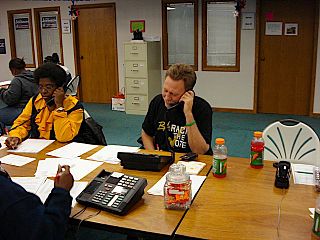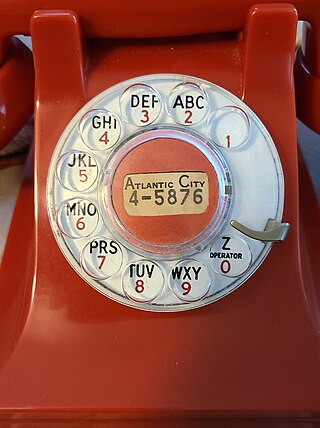
Telemarketing is a method of direct marketing in which a salesperson solicits prospective customers to buy products, subscriptions or services, either over the phone or through a subsequent face to face or web conferencing appointment scheduled during the call. Telemarketing can also include recorded sales pitches programmed to be played over the phone via automatic dialing.
Automatic number identification (ANI) is a feature of a telecommunications network for automatically determining the origination telephone number on toll calls for billing purposes. Automatic number identification was originally created by the American Telephone and Telegraph Company (AT&T) for long distance service in the Bell System, eliminating the need for telephone operators to manually record calls.
Premium-rate telephone numbers are telephone numbers that charge callers higher price rates for select services, including information and entertainment. A portion of the call fees is paid to the service provider, allowing premium calls to be an additional source of revenue for businesses. Tech support, psychic hotlines, and adult chat lines are among the most popular kinds of premium-rate phone services. Other services include directory enquiries, weather forecasts, competitions and ratings televoting. Some businesses, e.g. low-cost airlines, and diplomatic missions, such as the US Embassy in London or the UK Embassy in Washington, have also used premium-rate phone numbers for calls from the general public.
A collect call in Canada and the United States, known as a reverse charge call in other parts of the English-speaking world, is a telephone call in which the calling party wants to place a call at the called party's expense.
A toll-free telephone number or freephone number is one number that is billed for all arriving calls. For the calling party, a call to a toll-free number from a landline is free of charge. A toll-free number is identified by a dialing prefix similar to an area code. The specific service access varies by country.

A Zenith number was a telephone service in the United States that allowed a calling party to call the service subscriber at no charge by requesting the name Zenith and the number from a switchboard operator. The service preceded the system of toll-free telephone numbers with area code 800 in the United States. Some areas used the names "Enterprise" or "WX" number.
Phone fraud, or more generally communications fraud, is the use of telecommunications products or services with the intention of illegally acquiring money from, or failing to pay, a telecommunication company or its customers.

In the United Kingdom, telephone numbers are administered by the Office of Communications (Ofcom). For this purpose, Ofcom established a telephone numbering plan, known as the National Telephone Numbering Plan, which is the system for assigning telephone numbers to subscriber stations.
A telecommunications tariff is an open contract between a telecommunications service provider and the public, filed with a regulating body such as state and municipal Public Utilities Commissions and federal entities such as the Federal Communications Commission (FCC). Such tariffs outline the terms and conditions of providing telecommunications service to the public including rates, fees, and charges.

Crazy Frog is a Swedish CGI-animated character and Eurodance musician created in 2003 by actor and playwright Erik Wernquist. Marketed by the ringtone provider Jamba!, the character was originally created to accompany a sound effect produced by Daniel Malmedahl while attempting to imitate the sound of a two-stroke engine.

The dialling plan for mobile networks and new landline operators is closed; all subscriber numbers must be dialled in full. For landline numbers starting with 02, the dialling plan used to be open; the trunk digit and area code could be omitted if the caller was in the same area code as the callee. However, starting May 3, 2008, all landline numbers must be dialled in full.
The Brazilian telephone numbering plan uses a two-digit area code plus eight-digit local phone numbers for landlines and nine digits for mobile lines. Public utility services use short phone numbers, always starting with 1.
A quiz channel is a television channel that focuses on phone-in quizzes. The quizzes usually focus on puzzles, such as filling in blanks, identifying subjects, or other forms of word puzzles. The channels make money by encouraging viewers to call a toll phone number for the chance to play.

The New Zealand telephone numbering plan describes the allocation of telephone numbers in New Zealand and the Pitcairn Islands.

Phones 4u was a large independent mobile phone retailer in the United Kingdom. It was part of the 4u Group based in Newcastle-under-Lyme, Staffordshire. Opening in 1996, it expanded to over 600 stores. On 14 September 2014, EE and Vodafone, the company's final remaining suppliers, ended their contracts.
A non-geographic number is a type of telephone number that is not linked to any specific locality. Such numbers are an alternative to the traditional 'landline' numbers that are assigned geographically using a system of location-specific area codes. Non-geographic numbers are used for various reasons, from providing flexible routing of incoming phone calls to generating revenue for paid-for services.

The Advertising Standards Authority (ASA) is the self-regulatory organisation of the advertising industry in the United Kingdom. The ASA is a non-statutory organisation and so cannot interpret or enforce legislation. However, its code of advertising practice broadly reflects legislation in many instances. The ASA is not funded by the British government, but by a levy on the advertising industry.
Controversy over Sky's operation of pay TV services on Freeview began in 2006. It was claimed at various times that Sky was operating in an anti-competitive way in the British pay TV market. Similar concerns arose about Sky's procurement, distribution and charging levels of films on its Sky Movies service. Sky was exonerated by the Competition Commission in August 2012. Sky was found to have overcharged for its Sky Sports channels, and was ordered in 2010 to reduce its charges for these channels. Its terms for supplying the sports channels to other companies were also challenged in 2010–11; some of the complaints were upheld by the regulatory authorities, others were not. Another challenge, in 2009, concerned Sky's charges for listing free-to-air channels on its electronic program guide (EPG).
Telephone numbers in the United Kingdom have a flexible structure that reflects their historical demands, starting from many independent companies through a nationalised near-monopoly, to a system that supports many different services, including cellular phones, which were not envisaged when the system was first built. Numbers evolved in a piecemeal fashion, with numbers initially allocated on an exchange-by-exchange basis for calls connected by manual operators. Subscriber numbers reflected demand in each area, with single digit telephone numbers in very rural areas and longer numbers in cities.
UK Calling is the name given to the legislation introduced by Ofcom in July 2015 to make the cost of calling UK service numbers clearer for everyone.







